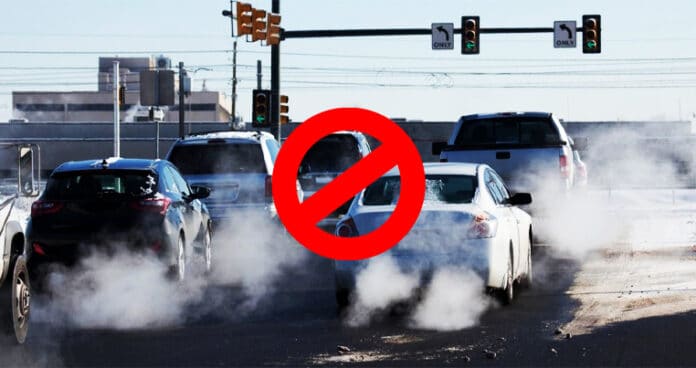The European Union (EU) has approved a series of steps to fight climate change, including a compromise on gradually eliminating fossil fuel cars by 2035. Environment ministers stated that the Council will introduce a 100% CO2 reduction target for new vehicles by 2035. It means that starting from 2035, new cars with internal combustion engines (ICE) will not be allowed to be sold in the EU. Currently, only Germany has agreed with the EU but still wants to sell cars running on carbon-neutral fuel.
This is one of the EU’s major policies to curb the rising greenhouse gas emissions and speed up the process of shifting towards electric vehicles. The 27-member bloc has claimed to cut 55% emissions by 2030 and become carbon-neutral by 2050.
Fossil Fuel Cars Ban faces Resistance
The debate surrounding the future ban on the sales of fossil fuel cars has faced some resistance as well. 5 EU nations refused to back the bloc’s plan and called to make some changes and delay it a bit. These nations are Portugal, Bulgaria, Itlay, Romania, and Slovakia. They proposed a 90% reduction target for CO2 cars by 2035 and a 100% by 2040. They also said there should be an 80% target for light commercial vehicles by 2035 and a 100% by 2040.
In a joint document, these 5 nations said there must be an “adequate and tailored” transition period before completely cutting off cars running on petrol and diesel. Bulgaria highlighted a significant purchasing power difference between European countries. It wanted the EU to introduce policies after carefully considering the economic and social factors. Besides these 5 countries, European Automobile Manufacturers’ Association (ACEA) also opposed the 100% target by 2035.
Germany on the other hand said it would support the EU’s proposal if the bloc allowed an option to sell cars running on CO2-neutral fuel. This could force the EU to come up with a separate proposal allowing CO2-neutral cars. Germany is the biggest car market in Europe and it is unlikely it would support any plan that hinders its own.
What Will the EU Do?
The next stop for the bloc is to negotiate with European Parliament, which also supports the complete ban on fossil fuel cars by 2035. Even though some EU countries are reluctant, the Council is moving ahead with its Fitfor55 plan, which refers to the bloc’s target of cutting 55% greenhouse gas emissions by 2035. The European Commission has a common position on issues the Council and Parliament raised. It said there was a very short deadline and “the world is not going to wait”. Addressing the climate crisis is the most urgent issue for the EU. The Commission called Europe to show unity and determination, unlike the US, which is focused on its unhealthy obsession with Russia.
Transition Requires Support
The new carbon policy is likely to increase energy costs in Europe. The Environment, Public Health and Food Safety (ENVI) and Employment and Social Affairs (EMPL) committees established a Social Climate Fund to protect the low-income households, small enterprises, and public transport users from the impact of the transition toward carbon-neutrality. The Commission agreed to have 59 billion EUR or 62 billion USD for the Fund.
Member states can submit proposals to the Commission about spending the funds. The money can be used to help people, build energy-efficient homes, or subsidise zero-emission transportation. Many people would inevitably require assistance during a significant shift toward a clean and green environment. Several cities have already started to place zero-emission zones where fossil fuel cars have to pay a fee to enter. Oxford, UK, was the world’s first city to introduce a zero-emission zone. Only electric vehicles are allowed to roam freely over there.


